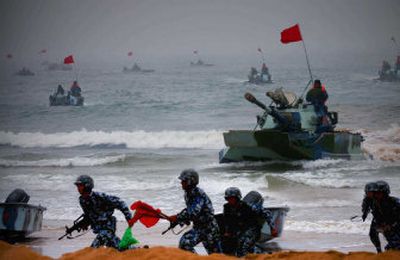Normandy? No, Shandong

SHANGHAI, China – Thousands of Chinese and Russian troops launched a mock amphibious landing on a Chinese beach Wednesday as Moscow’s defense minister said the joint war games underscore a growing strategic partnership between the former Cold War adversaries.
Chinese state television showed fog and rain blanketing the coast of the northern Chinese province of Shandong as landing craft disgorged troops and amphibious tanks and armored vehicles in the heavy surf.
Bombers and fighter jets attacked imaginary targets on shore as soldiers charged through seaside scrub and rappelled down ropes from helicopters.
Defense Minister Sergei Ivanov met Wednesday with his Chinese counterpart Cao Gangquan, telling him the unprecedented war games showed their “strategic cooperative partnership has entered into a new stage,” China’s official Xinhua News Agency said.
Cao replied that the exercises deepened trust and cooperation in military affairs and had “an important realistic significance and profound historic impact on the safeguarding of regional and world peace and security.”
The eight-day exercise, dubbed “Peace Mission 2005” and expected to end Thursday, involved about 7,000 Chinese troops and 1,800 Russians, along with state-of-the-art warships, warplanes and armor.
Although the two nations have previously participated in border security exercises involving other Central Asia countries, the joint war games represent the first real military cooperation between them.
Chinese and Russian generals have sought to reassure the region that the exercises aren’t directed against any other nation. Under a fictional scenario, the forces have a U.N. mandate to stabilize a country plunged into violence by ethnic strife.
Yet, Chinese media and military analysts say the exercises also are aimed at showing Washington that Russia and China can respond to provocations, especially over Taiwan, which China has vowed to reclaim by force if necessary.
The two nations have also been unnerved by U.S. deployments in Central Asia and have used their dominance of the six-nation Shanghai Cooperation Organization – whose defense ministers are observing the drills – to demand withdrawals of American forces.
Washington has said it would withdraw from Uzbekistan and Kyrgyzstan once combat operations in Afghanistan were finished. Last month, however, Uzbekistan ordered U.S. troops to leave the country within 180 days.
Defense Secretary Donald Rumsfeld said Tuesday the U.S. was monitoring the games, but didn’t see them as threatening.
Russia is seen as using the exercises to pitch further sales of weapons to China, one of its leading customers, including long-range strategic bombers able to carry nuclear weapons.
Russia and China fought border skirmishes after falling out in the 1950s. However, ties have strengthened following the rise of autocratic President Vladimir Putin, aided by China’s hunger for Russian oil and gas and mutual concerns over U.S. military deployments.